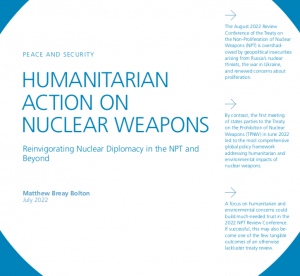 The use and testing of nuclear weapons has had catastrophic humanitarian and environmental consequences, which have been inadequately addressed by global policy. The Treaty on the Prohibition of Nuclear Weapons (TPNW), negotiated at the United Nations (UN) in 2017, is a categorical rejection of what had been the only weapons of mass destruction not yet banned by international law. But the TPNW also includes “positive obligations,” addressing the ongoing consequences of nuclear weapons use, testing, and related activities. These provisions were a major topic of discussion at the first meeting of states parties to the TPNW in June 2022 in Vienna, Austria. Discussions also centered on survivors’ voices and offered surprising moments of openness and collaboration between states parties and observer states that are not yet party to the TPNW, including some in nuclear alliances. The resulting Vienna Action Plan outlines a practical and forward-looking agenda, addressing the long-neglected impact of the more than 2,000 nuclear detonations in affected communities. It also provides opportunities for states to pursue other diplomatic priorities of the 21st century, including sustainable development, gender equity, disability justice, the rights of Indigenous Peoples, and mitigation of environmental pollution.
The use and testing of nuclear weapons has had catastrophic humanitarian and environmental consequences, which have been inadequately addressed by global policy. The Treaty on the Prohibition of Nuclear Weapons (TPNW), negotiated at the United Nations (UN) in 2017, is a categorical rejection of what had been the only weapons of mass destruction not yet banned by international law. But the TPNW also includes “positive obligations,” addressing the ongoing consequences of nuclear weapons use, testing, and related activities. These provisions were a major topic of discussion at the first meeting of states parties to the TPNW in June 2022 in Vienna, Austria. Discussions also centered on survivors’ voices and offered surprising moments of openness and collaboration between states parties and observer states that are not yet party to the TPNW, including some in nuclear alliances. The resulting Vienna Action Plan outlines a practical and forward-looking agenda, addressing the long-neglected impact of the more than 2,000 nuclear detonations in affected communities. It also provides opportunities for states to pursue other diplomatic priorities of the 21st century, including sustainable development, gender equity, disability justice, the rights of Indigenous Peoples, and mitigation of environmental pollution.
By contrast, traditional forms of nuclear diplomacy are stymied by entrenched positions, exclusion, acrimony, obfuscation, and little real-world impact. The 1968 Treaty on the Non-Proliferation of Nuclear Weapons (NPT) is widely regarded as the »cornerstone« of international law and diplomacy on nuclear weapons. However, the NPT states parties are gather- ing in New York for their August 2022 Review Conference at a time of great insecurity. The previous Review Conference, in 2015, failed to come to an agreed outcome. Russia’s hinted nuclear threats and the war in Ukraine, increasing nuclear modernization and rearmament across the nuclear-armed states, and renewed concerns about proliferation have taken global tensions to a height not seen since the Cold War.
In this context of increasing peril, addressing the ongoing humanitarian and environmental impacts of nuclear use and testing could serve as a confidence and security-building measure, with the potential to revive trust between states to the NPT and beyond. States in the Western security architecture, including NATO and other nuclear alliances, should set aside ideological obstacles blocking cooperation with TPNW states parties and engage pragmatically to assist victims of and remediate environments contaminated by nuclear weapons.
This new study by Dr. Matthew Breay Bolton, director of Pace University’s International Disarmament Institute, starts by outlining the ongoing humanitarian and environmental impact of nuclear weapons use, testing, and related activities. It shows how weak and fragmentary global policy has failed to adequately address such concerns, stymied by traditional nuclear geopolitics. However, the re- port then demonstrates how cooperative diplomacy on the victim assistance and environmental remediation provisions of the TPNW has developed a comprehensive new framework for supporting affected communities. While states in the Western security architecture have so far only demonstrated ambivalent engagement with the TPNW and its positive obligations, this report offers a case study of humanitarian efforts addressing landmines, cluster munitions, and other explosive remnants of war as a useful model for pragmatic collaboration. The study, published by Friedrich Ebert Foundation’s New York Office, calls on foreign aid donors to contribute to nuclear victim assistance and environmental remediation, concluding with recommendations for further policymaking in the NPT, TPNW, and beyond.
